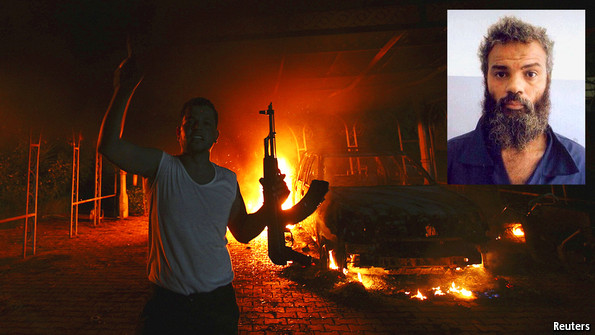
WASHINGTON – The Justice Department announced Tuesday that it will not seek the death penalty against Ahmed Abu Khattala, 54, a U.S.-designated terrorist whom prosecutors accuse of leading the 2012 attacks in Benghazi, Libya, that killed four Americans.
The announcement, contained in a notice to the federal trial court in Washington, clears the way for a major terrorism trial in the nation’s capital, the first in the U.S. since 2015, barring a plea agreement by Abu Khattala.
The decision ended a lengthy review after President Barack Obama aired concerns in October that while he supported capital punishment in theory, he found it “deeply troubling” in practice.
The move marked somewhat of a shift for the department, one year after federal prosecutors last May secured a death sentence in a capital terrorism case against Dzhokhar Tsarnaev, for the 2013 Boston marathon bombings.
The department approved its first new capital prosecution in November under Attorney General Loretta Lynch – who called the death penalty an “effective punishment” before her Senate confirmation in April 2015 – against Noe Aranda-Soto, an illegal immigrant accused of human trafficking and murder in Texas.
However, analysts said the government faced a difficult calculation in the Benghazi case, pointing to complex legal, political and national security concerns that have produced a mixed record in capital terrorism cases, and to a history in which no District of Columbia jury has ever imposed the death penalty.
“We do these on a case-by-case basis,” a Justice Department official said, declining to elaborate. Legal observers noted challenges facing the U.S. government in bringing witnesses from Libya to testify in a U.S. courtroom amid sectarian conflict in the region.
A trial date before U.S. District Judge Christopher Cooper of the District of Columbia has not been set.
Abu Khattala commanded a brigade absorbed by the extremist, anti-Western group Ansar Al-Sharia, which committed the Sept. 11, 2012, attacks that killed U.S. Ambassador J. Christopher Stevens and three others, according to U.S. investigators. The U.S. government in January 2014 designated Abu Khattala a terrorist and Ansar al-Sharia, an armed militia that seeks to establish Sharia law in Libya, a terrorist organization.
“The department is committed to ensuring that the defendant is held accountable for his alleged role in the terrorist attack on the U.S. Special Mission and annex in Benghazi that killed four Americans and seriously injured two others, and if convicted, he faces a sentence of up to life in prison,” Justice Department spokeswoman Emily Pierce said in a statement Tuesday.
The Obama administration authorized Abu Khattala’s capture in June 2014 U.S. Special Operations raid in Libya after luring him to a villa south of Benghazi.
He pleaded not guilty after being indicted on 18 counts, including death-eligible charges of murder of an internationally protected person, murder of an officer or employee of the United States, killing a person in an attack on a U.S. facility and providing material support to terrorists resulting in death.
In unsealing a July 2013 complaint with death-penalty eligible charges, then-attorney general Eric Holder said an investigation was ongoing, and that the arrest “proves that the U.S. government will expend any effort necessary to pursue terrorists who harm our citizens.”
A spokesman for U.S. Attorney for the District Channing Phillips referred questions about the decision by the attorney general’s office to the Justice Department.
Federal Public Defender for the District A.J. Kramer declined to comment.
The decision returned focus at least briefly to the criminal prosecution for an attack that remains so politically charged that it was raised in Republican presidential debates and dramatized in a feature film released nationwide last winter.
Democratic presidential candidate Hillary Rodham Clinton, testifying in October before a House select committee investigating the attacks, repeated her categorical denials of the long-debunked charge that she impeded rescue attempts. However, a State Department review concluded that security was inadequate for Benghazi, and the issue has continued to spur partisan crossfire.
In the Abu Khattala case, it remains unclear what impact a decision not to seek the death penalty might have on plea talks, even as national security concerns surrounding the prosecution persist.
(c) 2016, The Washington Post · Spencer S. Hsu

